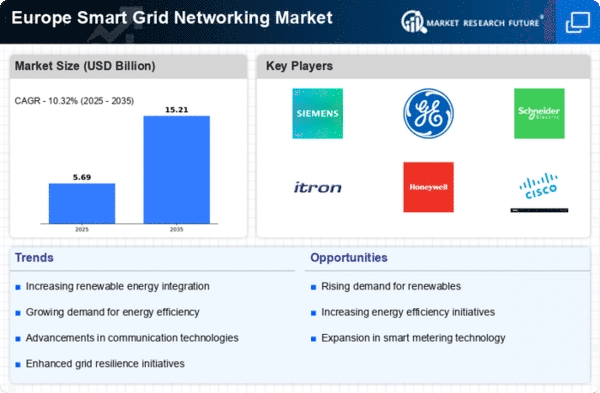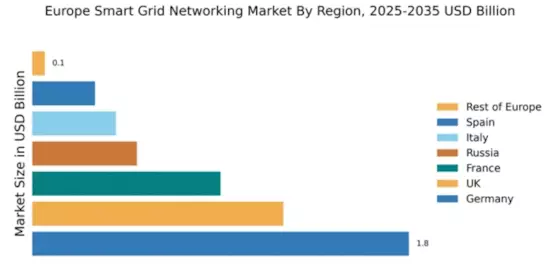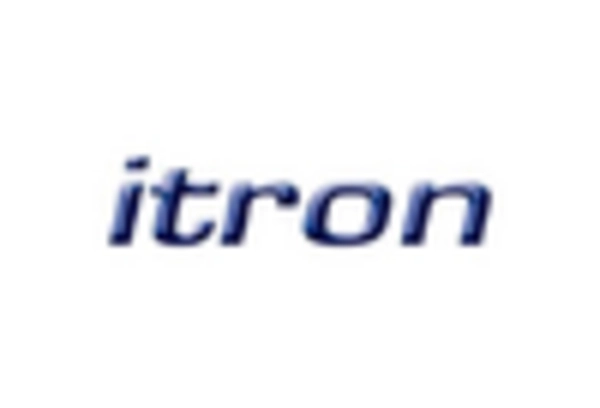Regulatory Support for Smart Grids
The regulatory landscape in Europe is increasingly supportive of smart grid initiatives, which is a crucial driver for the smart grid-networking market. Governments are implementing policies that promote the integration of renewable energy sources and enhance grid reliability. For instance, the European Union has set ambitious targets for reducing greenhouse gas emissions by at least 55% by 2030. This regulatory framework encourages investments in smart grid technologies, which are essential for managing distributed energy resources. The smart grid-networking market is projected to grow significantly as utilities and energy providers align their strategies with these regulations, potentially reaching a market value of €50 billion by 2027. This supportive environment fosters innovation and collaboration among stakeholders, further propelling the market forward.
Rising Demand for Renewable Energy
The increasing demand for renewable energy sources is a pivotal driver for the smart grid-networking market. As Europe aims to transition to a low-carbon economy, the integration of solar, wind, and other renewable energies into the grid becomes imperative. The European Commission estimates that renewable energy could account for over 60% of the EU's electricity generation by 2030. This shift necessitates advanced smart grid solutions to manage the variability and decentralization of energy production. Consequently, the smart grid-networking market is expected to expand, with investments in technologies that facilitate real-time monitoring and control of energy flows. This trend not only supports sustainability goals but also enhances energy security and resilience across the region.
Investment in Energy Storage Solutions
Investment in energy storage solutions is emerging as a critical driver for the smart grid-networking market. As the integration of renewable energy sources increases, the need for effective energy storage becomes paramount to ensure grid stability and reliability. Europe is witnessing a surge in investments in battery storage technologies, which are essential for balancing supply and demand. The European Battery Alliance aims to establish a competitive battery industry in Europe, with projections indicating that the energy storage market could reach €20 billion by 2030. This investment not only supports the smart grid-networking market but also enhances the overall resilience of the energy infrastructure, enabling a smoother transition to a sustainable energy future.
Increased Consumer Awareness and Engagement
Consumer awareness regarding energy consumption and sustainability is on the rise, serving as a significant driver for the smart grid-networking market. European consumers are becoming more informed about their energy usage and are increasingly seeking ways to reduce their carbon footprint. This shift in consumer behavior is prompting utilities to adopt smart grid technologies that provide real-time data and insights into energy consumption patterns. The smart grid-networking market is likely to see a surge in demand for solutions that empower consumers to make informed decisions about their energy use. This trend not only enhances customer satisfaction but also supports the overall efficiency of the energy system, potentially leading to a market growth of €30 billion by 2028.
Technological Advancements in Communication
Technological advancements in communication technologies are significantly influencing the smart grid-networking market. Innovations such as 5G and Internet of Things (IoT) are enhancing the capabilities of smart grids, enabling faster data transmission and improved connectivity. These technologies facilitate real-time monitoring and management of energy resources, which is essential for optimizing grid performance. The smart grid-networking market is likely to benefit from these advancements, as they allow for better integration of distributed energy resources and enhance consumer engagement. As a result, the market could see a compound annual growth rate (CAGR) of around 15% over the next five years, driven by the need for more efficient and responsive energy systems.

















